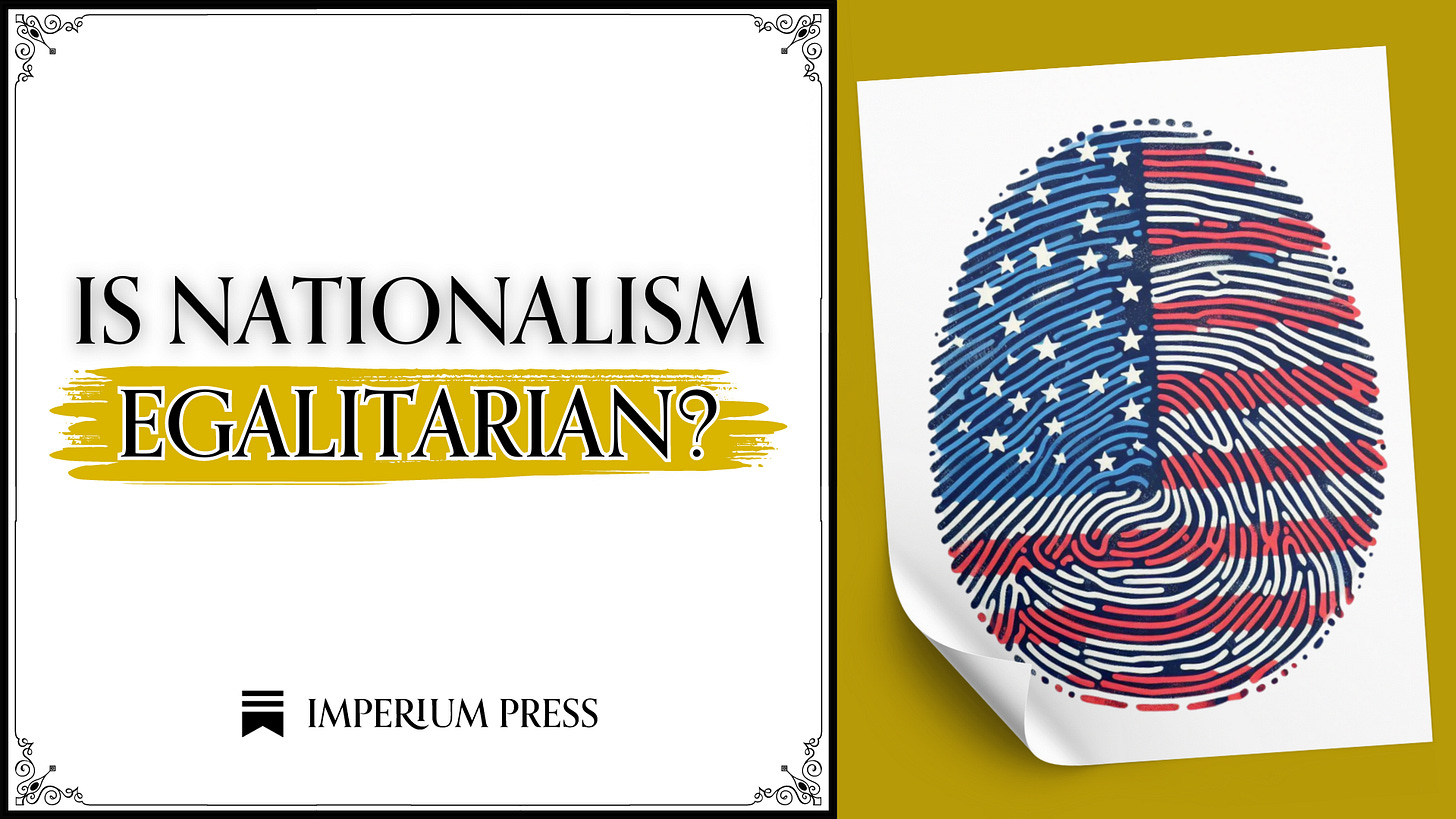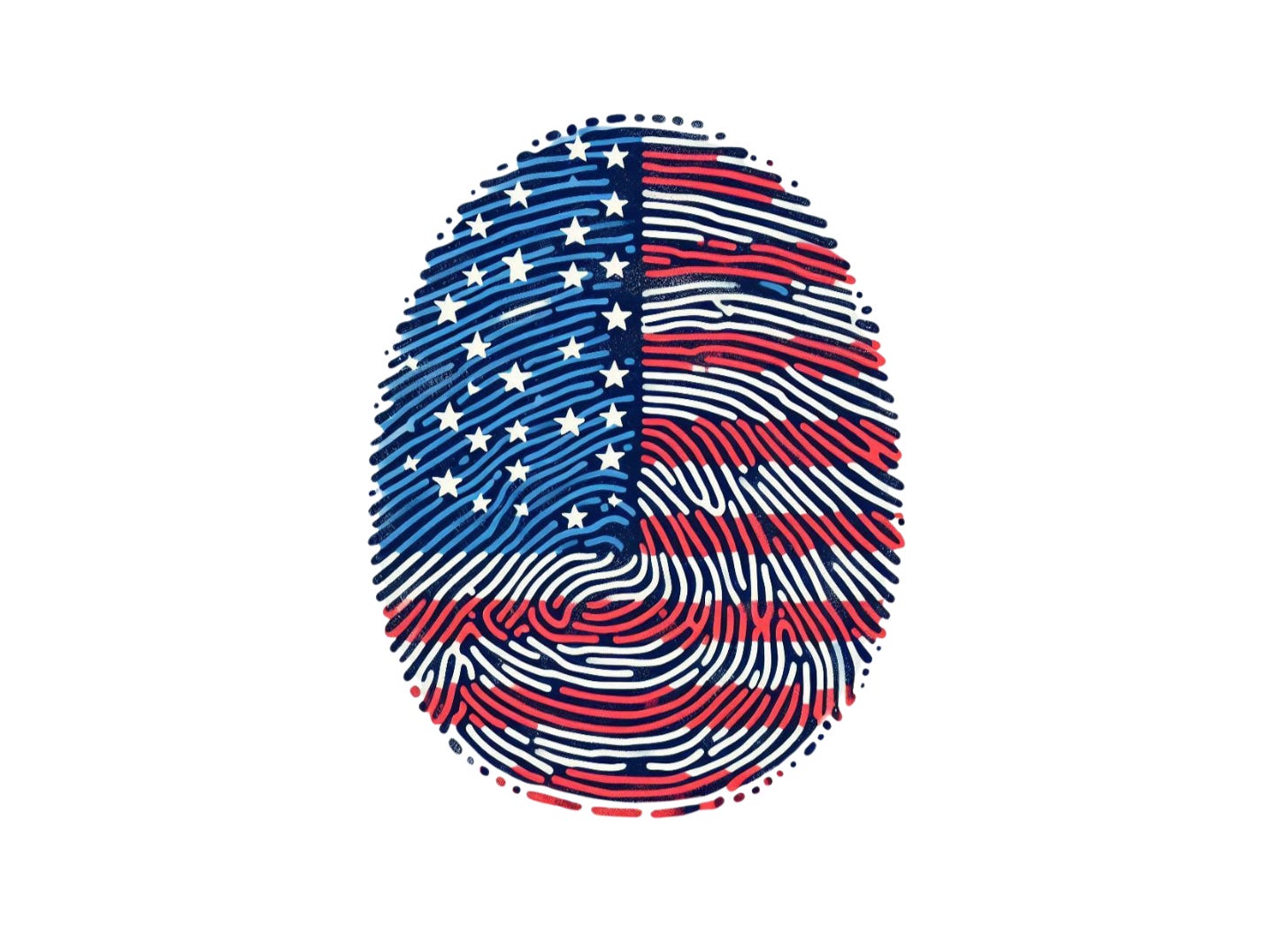If you prefer the audio of this article, click here.
Betteridge’s Law of Headlines states that any article headline that ends in a question mark can be answered by the word no. It’s pretty solid as a rule of thumb, but as the contrarians we are, we want to buck the trend and answer yes. Is nationalism egalitarian? Yes, it is. Can we do better? Yes, we can.
The term “nationalism” is quite misunderstood. It is taken to be a modern phenomenon, when it is really something ancient. When Odysseus yearns for the shores of Ithaca, when Sinuhe petitions king Senusret to let him return to Egypt and be buried there, when Cato Maior gets all uppity about this new-fangled and effeminate Greek stuff contaminating the manly virtus of Rome—all these people are expressing what we would now think of as nationalist sentiments.
And yet, there is something a bit different about nationalism in the modern era. There is especially something different about the sentiment of “a homeland for all”. This is where nationalism becomes an -ism. It ceases to be a straightforward orientation toward “our guys”, toward the folk, toward all that is ours and inside and “from here”. It feels that it must justify itself, rather than being the ground and starting point of justification. So it reaches for something beyond the folk, to something that is for all humanity. This is something new in the history of the world—nationalism-cum-universalism.
The reactionaries who say that nationalism was born in the French Revolution too often fail to see the ancient pedigree of nationalism, but they are right to see at least this change in its modern expression. Nationalism has been converted into a sort of universalism, and that means egalitarianism.
And the egalitarianism goes even further. When you talk to committed nationalists, they tend to emphasize nationality as a sort of golden mean between “petty” localism and humanity as a whole. There’s something in this too, in that only a wider folkhood than a clan or tribe can truly develop into a culture, and afford the protection to let those clans and tribes flourish. But then, the -ism starts to creep in, and as you drill down further to what the nationalist really believes, you find that yes, yes… hierarchy and all that good stuff, but what ultimately matters is that we are all Americans or Englishmen or what have you. Your core identity is your nationality. At the most important level, you are the same as tens or hundreds of millions of people. The reactionaries are not wrong. The fact is, modern nationalism has always tended toward egalitarianism.
We can do better than that. You all know where this is going.
Folkishness is considered a kind of populism. This makes sense because the etymology is cognate—folk vs. populus, made into a worldview. But as we have shown at length in many articles, folkishness is a lot more than being for the folk. It’s that, yes, but under the hood is a whole moral and even metaphysical structure that in-group orientation stands upon.
Populism is, roughly speaking, the idea that the people are the principal agent of political change and the end toward which that change is directed. Whatever is done in politics is done by the people and for the people. The idea of folkishness that we put forth disagrees with both of these. It does not merely assert the sovereignty or interests of the in-group, but develops a foundation on the grounds of which their interests can be defended. Nationalism also develops such a foundation, except it agrees with our basic statement of populism. But the foundation nationalism creates fails because it collapses into egalitarianism.
Let’s take our basic statement of populism—whatever is done in politics is done by the people and for the people—and see how folkishness disagrees.
Assuredly, it is not the people who move history. Taken as a bloc, the people is the thing acted upon, and not the principal actor in politics. Popular sovereignty is a myth, and has been refuted so thoroughly by the last five or so years that it barely needs to be addressed. However, because this myth keeps coming back within the right, we have addressed it in our article What’s Wrong with Liberalism? and it has been refuted in Parvini’s book The Populist Delusion and Bond’s book Nemesis, to say nothing of historical authors like Bodin, Filmer, Maistre, Schmitt, etc.
OK, so unlike nationalism, folkishness doesn’t suffer from the populist delusion. But isn’t it at least for the people? Aren’t their interests the normative foundation? Do we really not say salus populi suprema lex esto? No, we don’t. And we don’t for a very good reason—to put the interests of the people above all ensures that those interests will not be served.
Putting the interests of the people on the throne introduces what Dennis Bouvard has called super-sovereignty, the making of an abstract principle into the sovereign. That principle then becomes the focal point of argument over what really constitutes the interests of the people—is it really in the people’s interests to put themselves first at the expense of others, to gain the world and lose their soul? And what people are we even talking about? Everything you hate about the question “so what really is ‘white’ after all” is contained in the question “so what really constitutes the ‘interests’ of the people?”
Rather than a man or a family as the sovereign, you get a jellyfish, which in practice tends to conceal the sovereign rather than to be it. Even a high-minded ideal like the good of the folk is an ideal, and an ideal can’t rule, only a man with a will, and that will means a command.
Folkishness secures the interest of the people by aiming elsewhere, and securing it as a side effect.1 Rather than putting an abstraction on the throne, folkishness looks to something infinitely more objective—the commands of our forefathers. We have argued at length elsewhere how this is a better and more valid foundation. We have even argued that there is no alternative to command as a foundation. We will leave these arguments to one side. For now, we want only to address the equality question. (The EQ?) Nationalism says yes, yes… rank and hierarchy and Evola and all that—but then goes on to affirm equality as basic to the folk. Folkishness begins with inequality.
To very briefly summarize a few key folkish insights:
Authority as Primordial: No matter what you’re looking at or reasoning about, you have to start from some axiomatic foundation. Where do we get this axiomatic foundation? Authority. What authority? Your forefathers. How do we know theirs is the right foundation? We can’t. It’s axiomatic.
Ancestral Principle: Fatherhood is not just one kind of authority, but the very pattern of authority, which all traditions—from Christianity to paganism to secular humanist liberalism—agree with implicitly. Authority depends upon earlier authority, and that comes from the father.
Subordination of Metaphysics: Metaphysics is often taken to be basic to a worldview, but metaphysics is not the bedrock—that is tradition. There is no metaphysics that does not ultimately derive from tradition. Metaphysics cannot presume to correct or dictate to tradition. Metaphysics is the forest and tradition the trees.
For those new to this blog, these insights will strike you as unfamiliar. You’ve probably never seen them before as part of folkishness, nor as part of anything. What we’re doing here is to uncover, point out, and make explicit the root ideas behind in-group preference—what makes preference for your own not only justified but even possible.2 And it must be observed that one common thread between just these ideas we’ve listed, is hierarchy.
Nationalism of the modern kind tries to maintain ethnic boundaries but justifies these boundaries according to a universal framework, and so cedes all ground to the globalist. If universality is what truly matters, why not universal humanity? Folkishness doesn’t end up with hierarchy and difference, it starts with it. Really, it’s the ancient form of nationalism. This is why nationalism looks new to reactionaries—by the time it was named, it had lost its very soul.
Only folkishness maintains boundaries—not just ethnic, but moral and epistemic too. In fact, to lose one of these is to lose them all. Liberalism, nationalism, and yes, even fascism do not maintain these boundaries. It falls to us now to set folkhood on a truly solid footing. This is the project of the new millennium. Our enemies see it taking shape, and they are afraid. After 3,000 years, against all odds, the slumbering giant has begun to wake.
To achieve your goal you must aim at something else—also known as Goodhart’s law. We have expanded upon this in the article On Having Goals.
And to show you where this is going, as it turns out what we call folkishness is really the precondition and bedrock of any idea at all including universalism.







Equality was invented as a mean, not the end, to a problem of war. You need twice the enemy’s numbers to hold the ground after killed and wounded are added up. But you need to incentivize the followers to stick together. So, a Pater must introduce the idea of shared sacrifice and shared rewards while also introducing the possibility of higher ranks to advance to for exceptional service. So a elementary equality of the peers was introduced along with hierarchy of ranks. Too much equality can discourage talented youths from applying themselves, but too much inequality can also discourage the youths as well. So, there need to be a kind of flat inequality that will boost the investment of the youth in the state’s future.
Demanding Equality
Another strategy of the supposed nonplayer is to demand equality in ev-
ery area of life. Everyone must be treated alike, whatever their status and
strength. But if, to avoid the taint of power, you attempt to treat everyone
equally and fairly, you will confront the problem that some people do
certain things better than others. Treating everyone equally means ignor-
in their differences, elevating the less skillful and suppressing those who
excel.
Daily Law: Many of those who demand equality across the board are
actually deploying another power strategy, redistributing people's re-
wards in a way that they determine. Judge and reward people on the
quality of their work.
The 48 Laws of Power, Preface by Robert Greene